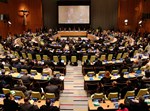Published on Wed, 2016-08-17 23:36
Iraqi Al-Amal Association (IAA), Social Watch focal point in Iraq, conducted its second workshop in Beirut, to discuss the draft bill on “Protection against Domestic Violence". Activist Hanaa Edwar head of IAA said "Our aim is to explain and discuss the important bill, and to work with the MPs and consultants, in order to reach the full conviction required to adopt and defend this bill, which we hope that the current session of the House of Representatives will be able to vote on and pass it”. Adding: "this law will be a real shield against domestic violence, committed by one family member against another reaching to a relative of the fourth degree, mostly women and children are the victims of such practices, which constitute a hidden crime. The bill includes mechanisms for the protection of victims such as creating safe centers and providing the necessary care and rehabilitation, and to punish the perpetrators of these crimes. Also, there are other steps that could be taken by the media and civil society organizations and other parties to limit the phenomenon of domestic violence, which escalated to levels that cannot be tolerated”. |
Published on Wed, 2016-08-17 22:32
The International Council for Adult Education (ICAE) announces the launch of the call for applications of the ninth edition of the ICAE Academy of Lifelong Learning Advocacy (IALLA) that will be held in Ouagadougou, Burkina Faso, from November 10 to 17, 2016. The ICAE Academy of Lifelong Learning Advocacy is the main international training programme that the International Council for Adult Education (ICAE) has created with the aim of broadening the vision on adult learning and helping new leaders acquire advocacy skills through a participatory methodology that includes an interlinkage analysis within and beyond the field of adult learning and education, and promoting networking as an effective mechanism for collective learning. Since its creation in 2004 they have had a growing number of applicants from all regions and at this moment there are 222 IALLA graduates from 74 countries of all regions. |
Published on Wed, 2016-08-17 20:11
The coup currently on course in Brazil, with great chance of succeeding in the next 30 days, has many faces and short- and long-term effects for the Brazilian population. In little over 100 days of interim government, the politically conservative and economically liberal agenda is being rapidly designed and raising fear among the most vulnerable sectors of the society, such as workers and retirees. It is now clear that the nebulous process of impeachment endangers historical achievements and the very capacity of the Brazilian state to deal with its historical ills. Regarding workers and retirees, sweeping reforms of the labor and welfare systems that would produce significant regressions on their rights are already well under way to implementation, without any concern about the legitimacy or the screen of the ballot boxes. Indeed, many take for granted their approval if the impeachment process goes ahead in the Federal Senate. |
Published on Mon, 2016-08-15 14:40
The United Nations High-Level Political Forum (HLPF) met in New York from 11 to 20 July 2016. It is the central UN body addressing sustainable development, and its chief task is to monitor the implementation of the 2030 Agenda and its global Sustainable Development Goals (SDGs). The HLPF is an intergovernmental Forum in which all 193 Member States of the United Nations can take part. In addition, representatives of major groups and civil society organizations have far-reaching options to participate. However, the Forum neither has any concrete decision-making powers nor does it perform a direct coordinating role vis-à-vis governments and UN organizations. It primarily serves the purpose of sharing information on strategies to implement the 2030 Agenda, presenting national (success) stories and critically analyzing obstacles and setbacks in achieving the SDGs. |
Published on Fri, 2016-08-12 18:59
The main challenge in implementing the 2030 Agenda in Finland will be integrating the principles and targets of sustainable development into all of the country's domestic policies, including those policies related to developing countries. Genuine political commitment is a prerequisite for implementing the 2030 Agenda broadly and coherently throughout the public administration. Different stakeholders have to be engaged and also take responsibility for implementing the goals. Implementation has to be monitored not only globally but also regionally. This requires sufficient planning, coordination and allocation of resources, which in turn requires political commitment to implementing the universal goals but also prioritizing policy actions in order to get a serious and efficient start. Committing to the goals means that attaining them is mainstreamed into all decision-making, and not just considered in a separate action plan. It is important to understand the 2030 Agenda in a holistic way, so that for example gender equality is not only a separate goal but also a cross-cutting theme. |
SUSCRIBE TO OUR NEWSLETTER







